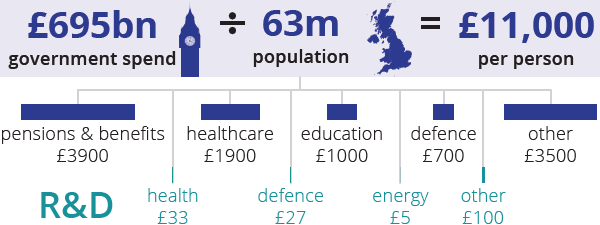Government spending
The UK government spent £695 billion on our behalf last year. This is a mind-bogglingly enormous amount of cash and so, to try to make sense of government spending, we’ve divided it up into pounds per person per year.
This seems to be the logical way to get your head around services consumed by individuals, because you can compare the costs and benefits received by people in return for what they spend. Since there are around 63 million of us in the UK, that £695 billion works out at about £11,000 per person per year to spend on everything from pensions to policing.

The spend per person on these different areas should give us an indication of how important we, as a society, consider them to be. Thankfully, in broad terms, these may be quite sensible: our biggest expenses are the welfare state (about a third of which is pensions), healthcare and education—things that most people think are both important and the government’s responsibility. This spending is mostly funded by taxation, but the government actually spends quite a lot more than it collects in tax: the UK is currently running a budget deficit of £1900 per person per year. (That sounds like a lot of money, but whether or not it’s unduly worrying is quite a knotty economic question.)
The most shocking figures are actually much smaller than the big-ticket items above: they’re the tiny amounts we invest in scientific research.
The government spend on research and development is around £160 per person per year. That’s less than 1.5% of total spending, and it’s pretty small fry compared to benefits and healthcare. Still, it’s hard to really know if it’s a lot or a little…after all, that £160 comes from a variety of different government departments, and is used to tackle all kinds of scientific questions. So, to make sense of this spending, we need to look at the diverse range of problems that science is trying to solve, and compare the scale of our efforts against the issues at stake.
So far, it’s probably hard to know whether to be shocked or not. So, keep reading: next up, we examine our spend on health research.